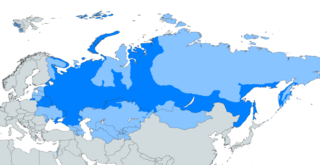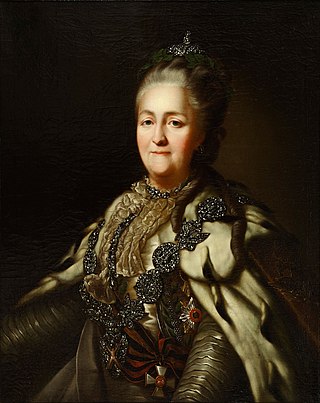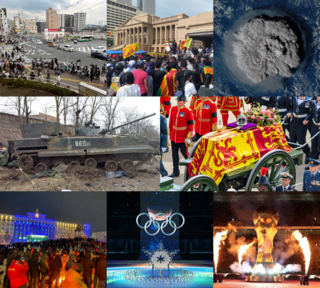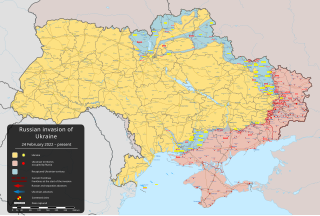
Moscow is the capital and largest city of Russia. The city stands on the Moskva River in Central Russia, with a population estimated at 13.0 million residents within the city limits, over 17 million residents in the urban area, and over 21.5 million residents in the metropolitan area. The city covers an area of 2,511 square kilometers (970 sq mi), while the urban area covers 5,891 square kilometers (2,275 sq mi), and the metropolitan area covers over 26,000 square kilometers (10,000 sq mi). Moscow is among the world's largest cities; being the most populous city entirely in Europe, the largest urban and metropolitan area in Europe, and the largest city by land area on the European continent.

Russia, or the Russian Federation, is a transcontinental country spanning Eastern Europe and Northern Asia. It is the largest country in the world, with its internationally recognised territory covering 17,098,246 square kilometres (6,601,670 sq mi), and encompassing one-eighth of Earth's inhabitable landmass. Russia extends across eleven time zones and shares land boundaries with fourteen countries. It is the world's ninth-most populous country and Europe's most populous country, with a population of 146 million people. The country's capital and largest city is Moscow. Saint Petersburg is Russia's cultural centre and second-largest city. Other major urban areas include Novosibirsk, Yekaterinburg, Nizhny Novgorod, and Kazan.

Russian is an East Slavic language mainly spoken in Russia. It is the native language of the Russians, and belongs to the Indo-European language family. It is one of four living East Slavic languages, and is also a part of the larger Balto-Slavic languages. Besides Russia itself, Russian is an official language in Belarus, Kazakhstan, and Kyrgyzstan, and is used widely as a lingua franca throughout Ukraine, the Caucasus, Central Asia, and to some extent in the Baltic states. It was the de facto language of the former Soviet Union, and continues to be used in public life with varying proficiency in all of the post-Soviet states.

The Soviet Union, officially the Union of Soviet Socialist Republics (USSR), was a transcontinental country that spanned much of Eurasia from 1922 to 1991. A flagship communist state, it was nominally a federal union of fifteen national republics; in practice, both its government and its economy were highly centralized until its final years. It was a one-party state governed by the Communist Party of the Soviet Union, with the city of Moscow serving as its capital as well as that of its largest and most populous republic: the Russian SFSR. Other major cities included Leningrad, Kiev, Minsk, Tashkent, Alma-Ata, and Novosibirsk. It was the largest country in the world, covering over 22,402,200 square kilometres (8,649,500 sq mi) and spanning eleven time zones.

Ukraine is a country in Eastern Europe. It is the second-largest European country after Russia, which it borders to the east and northeast. Ukraine covers approximately 600,000 square kilometres (230,000 sq mi). Prior to the ongoing Russian invasion, it was the eighth-most populous country in Europe, with a population of around 41 million people. It is also bordered by Belarus to the north; by Poland, Slovakia, and Hungary to the west; and by Romania and Moldova to the southwest; with a coastline along the Black Sea and the Sea of Azov to the south and southeast. Kyiv is the nation's capital and largest city. Ukraine's state language is Ukrainian; Russian is also widely spoken, especially in the east and south.

Vladimir Vladimirovich Putin is a Russian politician and former intelligence officer who holds the office of president of Russia. Putin has served continuously as president or prime minister since 1999: as prime minister from 1999 to 2000 and from 2008 to 2012, and as president from 2000 to 2008 and since 2012.

Catherine II, most commonly known as Catherine the Great, was the reigning empress of Russia from 1762 to 1796. She came to power following the overthrow of her husband, Peter III. Under her long reign, inspired by the ideas of the Enlightenment, Russia experienced a renaissance of culture and sciences, which led to the founding of many new cities, universities, and theatres; along with large-scale immigration from the rest of Europe, and the recognition of Russia as one of the great powers of Europe.

The Crimean War was fought from October 1853 to February 1856 between Russia and an ultimately victorious alliance of the Ottoman Empire, France, the United Kingdom and Piedmont-Sardinia.

2022 (MMXXII) was a common year starting on Saturday of the Gregorian calendar, the 2022nd year of the Common Era (CE) and Anno Domini (AD) designations, the 22nd year of the 3rd millennium and the 21st century, and the 3rd year of the 2020s decade.

World War I, often abbreviated as WWI, also known as the Great War, was one of the deadliest global conflicts in history. The main belligerents included much of Europe and their colonial empires, the Russian Empire, the United States, the Ottoman Empire and the Japanese Empire, with fighting occurring throughout Europe, the Middle East, Africa, the Pacific, and parts of Asia. An estimated 9 million soldiers were killed in combat, plus another 23 million wounded, while 5 million civilians died as a result of military action, hunger, and disease. Millions more died in genocides within the Ottoman Empire and in the 1918 influenza pandemic, which was exacerbated by the movement of combatants during the war.

The 2018 FIFA World Cup was the 21st FIFA World Cup, the quadrennial world championship for national football teams organized by FIFA. It took place in Russia from 14 June to 15 July 2018, after the country was awarded the hosting rights in 2010. It was the eleventh time the championships had been held in Europe, and the first time they were held in Eastern Europe. At an estimated cost of over $14.2 billion, it was the most expensive World Cup ever held until it was surpassed by the 2022 World Cup in Qatar.

The Russian Empire was an empire and the final period of the Russian monarchy from 1721 to 1917, ruling across large parts of Eurasia. It succeeded the Tsardom of Russia following the Treaty of Nystad, which ended the Great Northern War. The rise of the Russian Empire coincided with the decline of neighbouring rival powers: the Swedish Empire, the Polish–Lithuanian Commonwealth, Qajar Iran, the Ottoman Empire, and Qing China. It also held colonies in North America between 1799 and 1867. Covering an area of approximately 22,800,000 square kilometres (8,800,000 sq mi), it remains the third-largest empire in history, surpassed only by the British Empire and the Mongol Empire; it ruled over a population of 125.6 million people per the 1897 Russian census, which was the only census carried out during the entire imperial period. Owing to its geographic extent across three continents at its peak, it featured great ethnic, linguistic, religious, and economic diversity.

Saint Petersburg, formerly known as Petrograd (1914–1924) and later Leningrad (1924–1991), is the second-largest city in Russia. It is situated on the Neva River, at the head of the Gulf of Finland on the Baltic Sea, with a population of roughly 5.4 million residents. Saint Petersburg is the fourth-most populous city in Europe after Istanbul, Moscow and London, the most populous city on the Baltic Sea, and the world's northernmost city of more than 1 million residents. As Russia's Imperial capital, and a historically strategic port, it is governed as a federal city.

Nicholas II or Nikolai II Alexandrovich Romanov, known in the Russian Orthodox Church as Saint Nicholas the Passion-Bearer, was the last Emperor of Russia, King of Congress Poland and Grand Duke of Finland, ruling from 1 November 1894 until his abdication on 15 March 1917. During his reign, Nicholas gave support to the economic and political reforms promoted by his prime ministers, Sergei Witte and Pyotr Stolypin. He advocated modernization based on foreign loans and close ties with France, but resisted giving the new parliament major roles. Ultimately, progress was undermined by Nicholas's commitment to autocratic rule, strong aristocratic opposition and defeats sustained by the Russian military in the Russo-Japanese War and World War I. By March 1917, public support for Nicholas had collapsed and he was forced to abdicate the throne, thereby ending the Romanov dynasty's 304-year rule of Russia (1613–1917).

The Russo-Ukrainian War has been ongoing between Russia and Ukraine since February 2014. Following Ukraine's Revolution of Dignity, Russia annexed Crimea from Ukraine and supported pro-Russian separatists in the war in Donbas against Ukrainian government forces; fighting for the first eight years of the conflict also included naval incidents, cyberwarfare, and heightened political tensions. In February 2022, the conflict saw a major escalation as Russia launched a full-scale invasion of Ukraine.

This is a timeline of events related to alleged Russian interference in the 2016 United States elections.

The Mueller special counsel investigation was an investigation into Russian interference in the 2016 United States elections, links between associates of Donald Trump and Russian officials, and possible obstruction of justice by Trump and his associates. The investigation was conducted by special prosecutor Robert Mueller from May 2017 to March 2019. It was also called the Russia investigation, the Mueller probe, and the Mueller investigation. The Mueller investigation culminated with the Mueller report, which concluded that though the Trump campaign welcomed Russian interference and expected to benefit from it, there was insufficient evidence of a criminal conspiracy to charge Trump. The report did not reach a conclusion about possible obstruction of justice of Trump, citing a Justice Department guideline that prohibits the federal indictment of a sitting president. The investigation resulted in charges against 34 individuals and 3 companies, 8 guilty pleas, and a conviction at trial.

The Wagner Group, also known as PMC Wagner, is a Russian paramilitary organization. It is variously described as a private military company (PMC), a network of mercenaries, or a de facto private army of Russian President Vladimir Putin. The group operates beyond the law in Russia, where private military contractors are officially forbidden. While the Wagner Group itself is not ideologically driven, various elements of Wagner have been linked to neo-Nazis and far-right extremists.

Volodymyr Oleksandrovych Zelenskyy is a Ukrainian politician and former comedian and actor who has served as the sixth and current president of Ukraine since 2019.

On 24 February 2022, Russia invaded Ukraine in a major escalation of the Russo-Ukrainian War, which began in 2014. The invasion has resulted in tens of thousands of deaths on both sides. It has caused Europe's largest refugee crisis since World War II. About 8 million Ukrainians were displaced within their country by late May, and more than 7.9 million fled the country by 3 January 2023; within five weeks of the invasion, Russia experienced its greatest emigration since the October Revolution, in 1917.


















